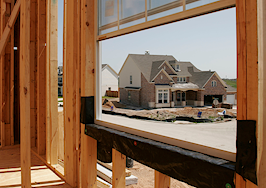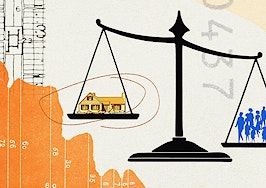The pandemic has changed everything. Unemployment is up, the stock market has gone nuts and millions of people are working remotely.
It’s only natural, then, that it would also change the way people are searching for real estate information. To better understand what’s going on, Inman combed through Google analytics data for online searches. And what that data indicates is that people appear to be more interested in broader home-related topics than ever before, but simultaneously less excited about transaction-specific information.
More intriguingly still, some experts believe the shifts in consumer preferences happening right now will long outlast the current crisis.
The best place to start is simply searching for the word “home,” which steadily rose in March as the outbreak worsened in the U.S.
A similar, but more pronounced, trend happened with the term “safe home,” with multiple major spikes in searches happening in late March. (The numbers in these graphs are relative, with 100 representing peak popularity during a given time span.)
Terms like “family home,” “home office” and “living room” have also all seen more action during the pandemic as well.

Ken Perlman
Ken Perlman, a principal at John Burns Real Estate Consulting, said these trends make sense given what’s going on outside.
“There is this sense from consumers that your home is your safe space, it’s a space I can control,” he told Inman. “I think the home in and of itself creates this sense of control, particularly in this environment where there isn’t a lot of control.”
Josh Stech, CEO of iBuyer Sundae, also noted that “the immediate concerns people have are practical and related to things like health, safety, and personal finance.”
“Their searches reflect increased uncertainty and worry about the value of their largest asset,” he told Inman. “We’ve heard from customers calling us just to see what their home is worth, though they’re not serious about selling their home.”
This all makes a lot of sense, but its also worth noting that online activity specifically related to real estate appears to be down. Searches for the term “real estate,” for example, dropped in mid March and have remained comparatively low ever since.
Searches for topics such as “house for sale,” “real estate agent” and “real estate broker” have also fallen over the last month as the pandemic spread.
It’s hard to know what each individual consumer is thinking right now, but taken as a whole these trends suggest that people may be thinking right now more about homes generally, but less about specific real estate activity.
According to Stech, a shift away from real estate specific issues may be happening because people “are justifiably reluctant to make a big financial decision like a home sale during an unpredictable and scary time.”
One notable exception to that trend, though, is searches for mortgage-related information, which have spiked during the crisis. Google’s data doesn’t indicate why spikes occur, though of course there has been a flood of refinancing thanks to low interest rates.
So why does any of this matter?
In the short term, it means that real estate agents will likely have to adapt their strategies to a changing landscape. This could be “bad news” for members of the industry, Stech said, because “volume is not likely to come back overnight.”
“Lower search volume for real estate related keywords makes sense given [that] we’ve seen large decreases in new listings across the country,” Stech said. “Real estate professionals will be facing more competition as there’s less activity in real estate.”
Stech also said some of the shifts in consumer preference right now could have longer term implications as well.
“In late March, for instance, real estate listing sites were showing massive year-over-year changes in page views of homes in rural areas and small towns,” he explained. “At the same time, page views for homes in urban metro areas with large populations decreased.”
Perlman agreed that the crisis may drive long term changes to consumer preference.
But that isn’t necessarily a bad thing. He pointed to homes than have office space, for example, or which can accommodate multigenerational households. The point is that while the pandemic is a terrible event, the longer term impact on consumer preferences may be a kind of silver lining because it’ll mean people have more options.
“I absolutely believe that this will have a long impact on how people live and how we design homes,” he concluded. “I think the way people think about this will impact how people interact forever.”













